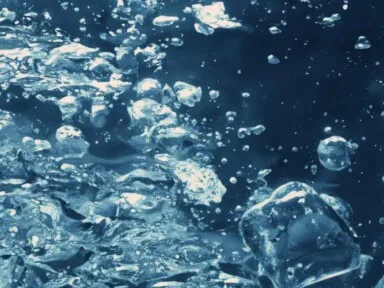What is deionized water? Simply put, it’s water without ions—but when it comes to application, it’s so much more than that. From equipment maintenance to routine cleaning around the house, deionized water has plenty of use cases that most might not know.
Read on to learn about the many applications of deionized water in and out of the house, as well as how it compares to other types of processed water.
In this article:
Understanding the Deionization Process
Deionized water is water that’s gone through a deionization—or demineralization—process, which removes the electrically charged ions from its surface. The process goes a step beyond reverse osmosis, which simply reduces solids and improves the quality of water. Instead, it neutralizes the cations and anions in the water to make a nearly mineral-free result.
Ion Exchange Mechanism
Deionized water is made possible via an ion exchange resin, which contains tiny beads that attract and swap out unwanted ions. As the cations and anions are run over the resin beads, they swap places with each of these regeneration components; transforming into hydrogen and hydroxyl, respectively. This eventually forms “pure” water, or H2O.
Types of Deionization
There are three primary types of deionization:
-
- Co-Current Deionization: Similar to how it sounds, this type of deionization happens when the water and regenerative components come through the top of an exchange tool, flowing concurrently to the bottom of the vessel.
-
- Counter-Current Deionization: This type of purification is the opposite of co-current deionization, as the regeneration chemicals and water flow will flow from different directions in the purification vessel. Typically, this is a more resource-efficient form of water purification.
-
- Mixed Bed Deionization: This form of deionization brings both resins to a mix in a single vessel, in a rough 50/50 ratio. This typically produces the highest quality water available with the least amount of impurities out of the three methods named, but it is more expensive to produce.
Applications of Deionized Water
While deionized water isn’t suitable for daily drinking water, its high purity and resistivity give it plenty of other helpful uses.
Industrial Uses
Deionized water systems saw a 7.5% year-over-year growth rate in 2024 alone, a large part of which was fueled by the many industrial uses it has. Demineralized water is crucial when it comes to lubrication and cooling processes in reactive environments that can’t tolerate the electrical conductivity found in normal, run-of-the-mill water (e.g., microchip production plants).
Laboratory Uses
Countries owe many of their scientific advancements to deionized water. Labs are a natural breeding ground for messes, and store-bought cleansers can disrupt organic compounds used in experiments. DI water works both as a solvent and a neutral cleanser, preserving results and ensuring the environment surrounding the experiment is as risk-averse as possible.
Medical and Pharmaceutical Uses
Pharmaceutical industries around the world continue to serve clients thanks to the water quality that deionized (or demineralized) water provides. Its lack of mineral buildup and natural purity allow it to be a safe dissolvent for vaccine and medication production, and it’s also able to be used as a material-safe cleanser in many environments.
Domestic Uses
Daily home use is probably the most common application of deionized water outside of the industries mentioned above. Many homeowners appreciate the streak-free cleaning abilities that this type of water brings to the table, and they can use it for various automotive maintenance to-dos. Deionized water is also commonly used in dehumidifiers and similar machines, as it allows the machine to function without mineral buildup or breakage.
Deionized Water vs. Other Types of Purified Water
Distillation, deionization, reverse osmosis—it’s easy to get overwhelmed with the many types of water purification systems available. We’ve outlined the primary differences between each below, giving you the information you need to make a confident decision between the types of water treatment options and products available.
Deionized vs. Distilled Water
While both water forms are considered “pure” in their own right, there are different definitions of purity at play between either definition. Distilled water doesn’t go through the ion exchange process; it’s made through heat and vaporization. This process can leave more minerals and particle-based contaminants behind, as it undergoes fewer processing steps than deionized water does.
Deionized water undergoes numerous processing stages, removing minerals and ions through the use of chemical resins and electricity—ultimately resulting in a type of “soft water.” This makes it the more objectively “pure” of the two, and it is also usable in a wider range of applications than distilled water is.
Deionized vs. Reverse Osmosis Water
Reverse osmosis water is what many of us drink every day, and it’s considered “pure” by human safety standards. It’s produced by passage over a membrane that catches solids and other larger particles contaminating the water, leaving just the liquid, salts, and oxygen behind. Reverse osmosis is an effective filtration method for everyday drinking water. Deionized water takes this process a step further, purging ions using chemical resins and a more nuanced process.
Safety and Risks of Deionized Water
While it may seem counterintuitive, DI water isn’t the best to drink despite its relative purity and popularity across industrial use cases. As it is deionized, it’s completely stripped of key minerals—such as calcium and magnesium—making it an inefficient way to hydrate and replenish daily required nutrients and minerals. This can lead to depletion over time, which has been associated with other health issues (such as malnutrition and muscular issues). It also doesn’t taste “good.”
If you’re working with DI water, it’s important to store it properly to protect its unique benefits. Because of how it’s processed, it easily absorbs metal compounds from its surrounding environment. It can also be contaminated by exposure to air packaging elements if mishandled. Always store your deionized water in a cool, dark place, ideally in a sanitized and sealed container.
Deionized Water is Helpful—Just Not For Hydration
Thinking about bringing DI water into your household? It’s an incredibly helpful cleanser that’s safe, resistant, and relatively neutral. It’s also ideal for running a humidifier or dehumidifier. However, if you’re looking for drinking water that’ll give you beneficial health effects, it’s best to look elsewhere.
Our recommendation? Leave the DI water to the cooling systems and specialty uses in your home and upgrade to a quality water filtration system with LeafHome.
Connect with us today to learn more about water purification systems and get expert advice about the best setup for your space.
Frequently asked questions
Is it safe to drink deionized water?
No, it isn’t recommended to drink deionized water. As it’s free of ions, it naturally draws necessary minerals—like calcium and magnesium—out of your body. Over time, this can lead to medical complications.
Does your water need more ions?
If you want water that’s safe to drink long-term, you should reach for water with ions in it. The presence of ions in your drinking water resists the attraction of crucial minerals in your body, helping you replenish yourself faster without any ill effects.
How is deionized water different from regular tap water?
Deionized water goes through a demineralization process using chemical resins that strip it of ions and certain contaminants. Regular tap water remains whole, containing ions.
How do I make deionized water?
If you’d like to make deionized water, you’ll need a system that uses ion exchange resin in a vessel of some sort. This can be as simple as using a deionization filter or purchasing a sophisticated mixed bed system.
Is bottled water deionized?
Bottled water is not deionized, as doing so would create a liquid that would pull minerals out of your tissues and otherwise deplete you. It may instead be purified using reverse osmosis, which pulls certain contaminants out of the water.




